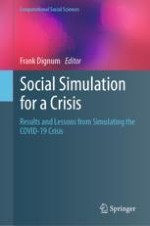2021 | OriginalPaper | Buchkapitel
14. Agile Social Simulations for Resilience
verfasst von : Maarten Jensen, Frank Dignum, Loïs Vanhée, Cezara Păstrăv, Harko Verhagen
Erschienen in: Social Simulation for a Crisis
Aktivieren Sie unsere intelligente Suche, um passende Fachinhalte oder Patente zu finden.
Wählen Sie Textabschnitte aus um mit Künstlicher Intelligenz passenden Patente zu finden. powered by
Markieren Sie Textabschnitte, um KI-gestützt weitere passende Inhalte zu finden. powered by
